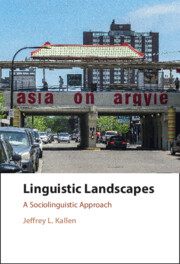Book contents
- Linguistic Landscapes
- Linguistic Landscapes
- Copyright page
- Contents
- Figures
- Places in Figures
- Diagrams
- Tables
- Preface
- Acknowledgements
- 1 Approaching the Linguistic Landscape
- 2 Why Linguistic Landscape?
- 3 Doing Things with Codes
- 4 Space and Landscape
- 5 People
- 6 The Linguistic Landscape as Discourse
- 7 Time, Space, and the LL
- 8 Researching Linguistic Landscapes
- References
- Index
5 - People
Published online by Cambridge University Press: 08 June 2023
- Linguistic Landscapes
- Linguistic Landscapes
- Copyright page
- Contents
- Figures
- Places in Figures
- Diagrams
- Tables
- Preface
- Acknowledgements
- 1 Approaching the Linguistic Landscape
- 2 Why Linguistic Landscape?
- 3 Doing Things with Codes
- 4 Space and Landscape
- 5 People
- 6 The Linguistic Landscape as Discourse
- 7 Time, Space, and the LL
- 8 Researching Linguistic Landscapes
- References
- Index
Summary
Building on the notions of markedness (which accounts for the special value attached to particular choices in language display) and affordances (which indicate what languages can be used for what purposes in specific contexts) in the Linguistic Landscape (LL), this chapter develops a social indexicality model to account for the role of language choices in pointing to communities of language users. These communities range from the local (such as graffiti crews or friendship groups) through various configurations of territory and community to the truly global. Language choices may make existential claims for marginalised social groups, and they allow for the status enhancement of local communities by enregisterment. Two case studies focus on territory and community. One presents a ‘village model’ in comparing the predominantly Protestant town of Kilkeel with the predominantly Catholic town of Warrenpoint in Northern Ireland, while the other examines ‘urban diversity’ with regard to displays of Greekness in Astoria (New York) and Greektown in Chicago. The chapter further examines the role of transient visitors and remote multinational organisations in shaping the LL.
Keywords
- Type
- Chapter
- Information
- Linguistic LandscapesA Sociolinguistic Approach, pp. 125 - 160Publisher: Cambridge University PressPrint publication year: 2023

